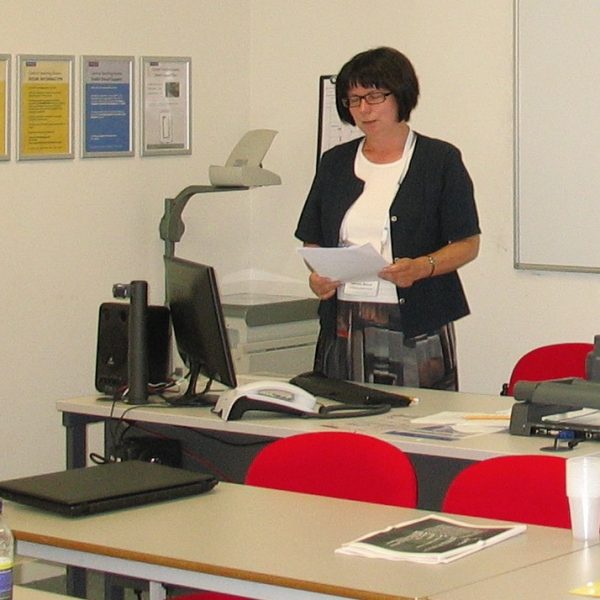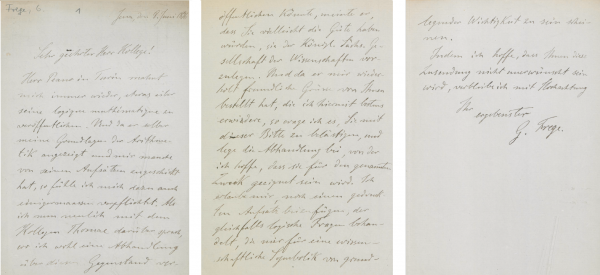RESEARCH EXCELLENCE INITIATIVE
FREEDOM OF RESEARCH – SCIENCE FOR THE FUTURE
„Freedom of research – science for the future” series consists of articles, interviews and short videos presenting research conducted by the winners of „Freedom of research” call for proposals
Gabriela Besler, PhD, DLitt, Associate Professor
The scientific phenomenon of Gottlob Frege
|Katarzyna Stołpiec|

For over 20 years, Gabriela Besler, PhD, DLitt, Associate Professor from the Faculty of Humanities has been exploring the phenomenon of philosophical, logical, and mathematical analyses of Gottlob Frege, a German professor of mathematics. Frege lived at the turn of the 19th and 20th centuries, and in the world of science his logic is deemed “the second after Aristotle.” Prof. G. Besler, an expert in the analytic philosophy, says: “Although there is a lot of books on Frege, when I was preparing the Polish edition of his abundant correspondence, I discovered that there are many threads nobody has yet dealt with. Among them is not thoroughly explored cooperation between Frege and Italian mathematicians Giuseppe Peano and Giovani Vailati, which I am very passionate about.”
“He was a modest and quiet scholar who gave rise to a completely new view of logic and philosophy. Many thinkers contemporary of him did not appreciate his innovative views. Fortunately, their critical position did not deter Frege from pursuing his genius, which has shaped an analytic philosophy, a breakthrough current well-known in world literature, especially in English,” says the scientist from the University of Silesia.
The main interest of Frege was the foundations of mathematics. Throughout the majority of his life, he tried to define what a number is, and on this basis build a logical basis of natural number arithmetic. Frege made extensive use of philosophical considerations in developing his theories. “Although he did not study philosophy before (he only attended two philosophy courses), he was using it intuitively. He single-handedly developed philosophical terms, which are crucial in analytic philosophy, especially in language philosophy. He introduced simple distinctions, yet very useful in this area. For instance, he distinguished sense from reference. He treated the sentence, not its elements, as the basic elements of the language. Thus, he formulated the principle of extensionality, allowing such changes of expressions within a given sentence so that its logical value (true or false) would not change,” says the scientist.
“The category of truth and false is broadly present until nowadays. It is not only logic, philosophy, or mathematics, but computer science as well. It is assumed that the truth is more important than the falsehood, but in logic, the falsehood is equally relevant and interesting as truth. A statement that a certain logical formula is false is concrete information,” explains Prof. G. Besler.
Frege was an idealist, he believed in “the third kingdom,” which he characterised as an ideal realm, which contains a collection of indisputable and invincible truths and falsehoods. A human has got limited cognitive access to “the third kingdom.” This concept was approved and developed by other scientists, e.g. Karl Popper.
Facsimile of the letter that appeared for the first time in the Polish translation of Frege’s correspondence:
G. Frege, Korespondencja naukowa. Wydanie krytyczne. Development of the Polish edition and verification of the translation: Gabriela Besler, Joanna Zwierzyńska. The University of Silesia Press, 2020, pp. 37-67. Katowice.
Licence CC0 1.0 | Source: www.ub.uni-leipzig.de
Another important programme developed by the mathematician was logicism. “Its father is deemed to be Gottfried Leibniz, its development however is credited to Frege,” states the scientist. “According to his view, the logical terms and procedures are to be the basis for defining essential mathematics terms. But it was not the only concept adopted from Leibniz. Frege believed that science should have one language common to all fields of science. It was to be universal, simple, and at the same time give the possibility for “reckoning.” Gottlob deemed his logic as such a language. Unfortunately, the language of records he used did not come into common use. The postulate of creating an ideal language was very common in Frege’s time. Ludwik Zamenhof was doing it as well, and he created Esperanto. In history, there is no scientist who was always successful. There is no doubt that the innovative view on logic and mathematics, Frege’s persistence and hard-working, contributed greatly to the development of many fields of science.
The current research carried out by Prof. G. Besler revolves around Frege’s cooperation with Italian mathematicians. “With me as a co-editor, in 2020 a 600-page publication Gottlob Frege. Korespondencja naukowa. Wydanie krytyczne was published. It also contains Frege’s correspondence with the mathematicians from Turin, Giuseppe Peano and Giovanni Vailati. When I was reading the letters, which included Frege and Peano’s comparisons of logic systems, I have found many threads nobody had written about yet. I would like to discuss this area. I collected a lot of materials, gathered interesting foreign contacts and I hope that, following Frege’s footsteps, I will establish equally productive cooperation on my own,” sums up the scientist.
Prof. Gabriela Besler plans to publish the results of her research in the History and Philosophy of Logic journal.






